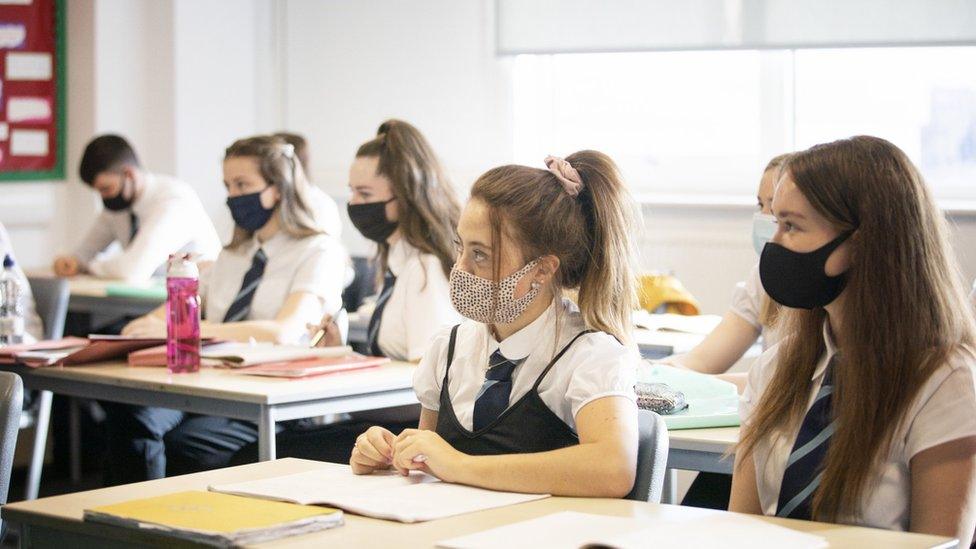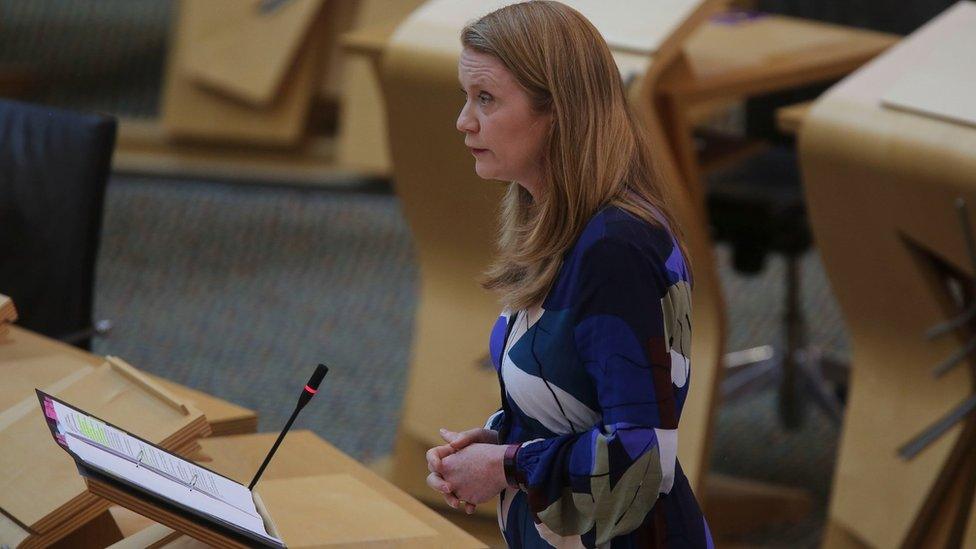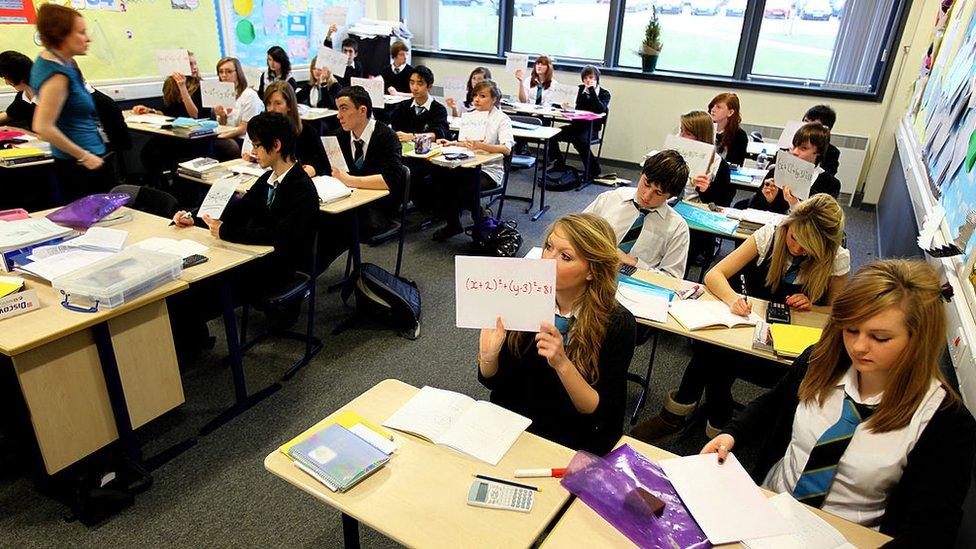Scottish Qualifications Authority to be scrapped after OECD review
- Published
- comments

The Scottish Qualifications Authority is to be replaced as part of a "substantial" overhaul of education, following an independent review.
The government said changes would be made in response to the OECD's report on the Curriculum for Excellence (CfE).
It backed the curriculum as a whole but said there was too much focus on exams in later years of schooling.
The exams body is to be broken up and replaced, with pupils, parents and teachers to be consulted on changes.
Schools agency Education Scotland is also to be shaken up, with responsibility for school inspections to be split off to a new independent system.
Education Secretary Shirley-Anne Somerville said there would be a "period of change" to "improve, to achieve more and to deliver for Scotland's pupils".
But opposition parties said the report was a "damning judgement of Scotland's exams system" and that reforms were "long overdue".
The independent report from the OECD - the Organisation for Economic Co-Operation and Development - was commissioned by the Scottish government in 2019, but pushed back due to the Covid-19 crisis.
The pandemic has brought particular focus onto the school qualifications system, with criticism of how grades have been decided after formal exams were cancelled two years running.
The long-awaited review backed the curriculum as a whole, but said there was a "misalignment" between its aims and the narrow focus on exams in later years.
It said the "visionary ideals" of the curriculum - which was meant to be focused on producing more rounded individuals rather than teaching to tests - had not fully succeeded, with the qualifications system a "barrier" to its aims in secondary education.

Ms Somerville said the report was "crystal clear that Curriculum for Excellence is the right approach for Scotland" - but said it was "right and proper that we review how it is being implemented".
She said: "We will replace the SQA. We will talk to young people, parents and teachers to build a system that works in line with CfE - exactly as the OECD recommends.
"Responsibility for inspection will no longer sit with Education Scotland and we will look at what further reform of the agency's functions is required.
"What comes next is a period of change. But it is change in order to improve, to achieve more and to deliver for Scotland's pupils. Our commitment is to do exactly that and we will work with everyone and anyone willing to help to make that a reality."
SQA chief executive Fiona Robertson welcomed the OECD report, saying the creation of a "new specialist agency" would be "an opportunity for significant change that will meet the future needs of our learners, our society and economy".


This looks like swift action from the Scottish government, but it's worth pointing out they have seen versions of this report and will have known about its findings for many weeks.
Ministers' full-bodied endorsement of the recommendations shows willingness and appetite for a shake-up of the system which has been stretched to its limits because of the pandemic.
This is all happening against a backdrop of criticism of the way the replacement system for exams has been handled this year, which has brought the debate to the front of the national conversation.
With formal tests now cancelled for two years in a row, could we have already seen the last diet of "status quo" examinations?

The government had previously said it would review the role of the SQA and Education Scotland, although First Minister Nicola Sturgeon also told MSPs she had full confidence in the exams body.
Ministers said they would "consult widely" on what the new system will look like, with a second report from the OECD expected in the autumn and talks to be held with young people, parents and teachers.
Some of the curriculum work currently undertaken by Education Scotland will be split off to the new assessment body, while its role in school inspections will also shift to a more independent system.
Opposition parties - which united to pass a Holyrood motion demanding reforms in February - said change in education was long overdue.

Education Secretary Shirley-Anne Somerville said there would be a period of change
Scottish Conservative education spokesman Oliver Mundell said the "damning" report "exposes how badly the SNP government has failed Scotland's schools".
He said: "This report is the final nail in the SNP's flawed education system. They have now been forced into a massive top-to-bottom overhaul of their mistakes."
Scottish Labour's education spokesman Michael Marra said the system was "in urgent need of reform and resources".
He added: "It is welcome that the SQA is to be scrapped and replaced by a new body. It has become increasingly clear that the organisation stood as a barrier to realising the full potential of Curriculum for Excellence."
Scottish Green MSP Ross Greer said the OECD report was a "damning judgement of Scotland's exams system and the body which oversees it", and warned that "replacing failed agencies won't automatically solve this problem".
And Lib Dem leader Willie Rennie said the "impenetrable bubble at the top of Scottish education" may be set to burst, adding that a "comprehensive package of bounce-back support for pupils" was also needed.

Ms Somerville told BBC Scotland that she would "challenge" opposition parties to come up with ideas for the new-look education structures.
She added: "Why don't we actually work together to start raising the debate on education, to see what we can develop within the parliament - but very importantly with young people and teachers about what they want to see."
The Curriculum for Excellence (CfE) was developed in the early 2000s and adopted across Scotland's schools from 2010/11.
In broad terms, it was a shift in focus away from the acquisition of knowledge for its own sake, with a greater emphasis being placed on how to use or apply knowledge.
Its aim was to give pupils a "holistic understanding" that equipped them to be successful learners, confident individuals, responsible citizens, and effective contributors.
However, the OECD said teaching methods became more "traditional" for pupils in secondary school, especially the senior phase, in order for them to pass exams.
The authors were told traditional teaching practices were seen as "the most efficient way to help students obtain their qualifications".
'Inspiring philosophy'
The OECD, an international organisation that works to build better policies, said Scotland was among the first education systems to embrace the 21st Century learning movement.
The report said the CfE offered "an inspiring and widely supported philosophy of education". However, it said adjustments might be needed in secondary school where the exams system was a significant barrier to its implementation.
Senior phase students reported an emphasis on rote learning and memorisation, which they described as "boring".
The OECD said the "backwash" from this may even be felt in primary schools where concerns about readiness for subject choice and examination success were mentioned by parents of the youngest pupils.
The report said Scotland could identify ways of assessing pupils that could be used in senior phase, such as continuous assessment, which would be better suited to the aims of the CfE.
- Published4 June 2021

- Published13 May 2021

- Published29 April 2020

- Published16 February 2021

- Published26 February 2020

- Published5 February 2020
